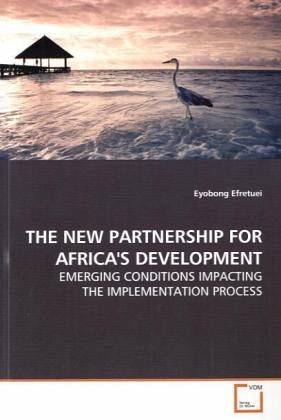
THE NEW PARTNERSHIP FOR AFRICA'S DEVELOPMENT
EMERGING CONDITIONS IMPACTING THE IMPLEMENTATION PROCESS
Versandkostenfrei!
Versandfertig in 6-10 Tagen
52,99 €
inkl. MwSt.

PAYBACK Punkte
26 °P sammeln!
African continent has witnessed many tragichistorical peculiarities from the advent ofcolonialism up to the present day. Most Africannations inherited colonial political andsocioeconomic structures as legacies through whichnational development processes were pursued. Up tilthe late 20th Century, the development indexes of thecontinent remained largely unequaled and inebriated.Nepad has initiated vitally important sector-specificpolicy goals as action plans set for implementation.The process through which the policy goals are to beachieved is equally critical but has been subsumed inthe current...
African continent has witnessed many tragic
historical peculiarities from the advent of
colonialism up to the present day. Most African
nations inherited colonial political and
socioeconomic structures as legacies through which
national development processes were pursued. Up til
the late 20th Century, the development indexes of the
continent remained largely unequaled and inebriated.
Nepad has initiated vitally important sector-specific
policy goals as action plans set for implementation.
The process through which the policy goals are to be
achieved is equally critical but has been subsumed in
the current debate and in the implementation domain
of Nepad. The implementation processes are afflicted
with complexities and unique unanticipated
contingencies. Major impediments to implementation
have always been neglected, absence of considerations
for peculiar contingencies that underlie the
processes. This study seeks to undertake comparative
analysis of the precursory regional development
policy initiatives, especially the European Union s
[EU s] implementation configuration, where
applicable, as parameters in the implementation
process of Nepad.
historical peculiarities from the advent of
colonialism up to the present day. Most African
nations inherited colonial political and
socioeconomic structures as legacies through which
national development processes were pursued. Up til
the late 20th Century, the development indexes of the
continent remained largely unequaled and inebriated.
Nepad has initiated vitally important sector-specific
policy goals as action plans set for implementation.
The process through which the policy goals are to be
achieved is equally critical but has been subsumed in
the current debate and in the implementation domain
of Nepad. The implementation processes are afflicted
with complexities and unique unanticipated
contingencies. Major impediments to implementation
have always been neglected, absence of considerations
for peculiar contingencies that underlie the
processes. This study seeks to undertake comparative
analysis of the precursory regional development
policy initiatives, especially the European Union s
[EU s] implementation configuration, where
applicable, as parameters in the implementation
process of Nepad.












